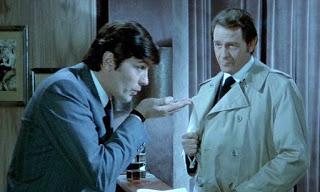
"People will do the wrong thing, they always do."
Alain Delon switches from criminal to cop in Un Flic (1972), Jean-Pierre Melville's final film. More flawed than Melville's earlier work, it nonetheless retains his oeuvre's existential angst and impeccable style.Police Superintendent Eduoard Coleman (Alain Delon) juggles several cases in Paris. Most pressing is a Saint-Jean-de-Monts bank robbery which leaves a teller dead and a criminal seriously injured. Unbeknownst to Coleman, the robbers are led by nightclub owner Simon (Richard Crenna), who's caught in a love triangle with Coleman and Cathy (Catherine Deneuve). Using informants and intuition, Coleman realizes that Simon's gang is planning an even bigger heist.
Un Flic showcases Melville's stoicism. He and photographer Walter Wottitz bathe everything in a muted, moody blue, as if the storm in the opening stains the atmosphere. Long scenes play with little or no dialogue, Melville inferring character with telling close-ups and montage. Coleman trades glances with a corpse, or sizes Simon up once his suspicions are aroused, forcing viewers to read into each tic and telltale grimace. Coleman, Simon and Cathy share glances in the nightclub, either oblivious to their mutual entanglement or willingly playing a charade.
Perhaps Melville's character dynamics aren't as compelling as they could be: Cathy's not only Simon's lover but a sometime-participant in his crimes, yet never feels as substantial as her men. Coleman's a rough cop who beats suspects and harangues informants, including a transsexual he threatens with public humiliation. Simon's cool professionalism seems more appealing, yet the protagonists are more similar than different: amoral, violent, gamely courting death.
Melville's nifty mise en scene extends to his heist scenes, rivaling even Le Cercle Rouge's jewel robbery. The opening casts its bank robbery amidst a sweeping rainstorm, with whipping winds and pattering precipitation punctuating the robber's preparations. It's topped by a show-stopping train hold-up, which takes over twenty minutes to unspool. Melville relishes Simon's every movement, from fastidiously combing his hair to picking a lock with a magnet. Un Flic turns cops and robbers clichés into art.
Alain Delon's tough cop isn't markedly different from his killers, allowing momentary flickers of warmth, doubt and humanity to compromise his professionalism. Equally guarded at work and rest, Delon nonetheless conveys a subtle breakdown as he spots betrayal under his nose. Richard Crenna provides a good match, alternating sly cool with rough determination. Catherine Deneuve is more eye candy than compelling character, and the supporting cast is largely interchangeable.
Un Flic isn't entirely satisfying: the particulars of Simon's plot seem undercooked and the resolution conveniently dovetails with another Coleman investigation. Still, the movie ends on a note of bleak resignation, with Coleman shattering his self-confidence as he confronts Simon. He ends the film staring into space as a telephone rings, contemplating his lifetime entrapment.

